New poll reveals 50% of Canadians 18-24 favour socialism, but few Canadians willing to pay for it
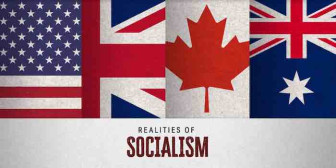
VANCOUVER—More than 4-in-10 Canadians—and half of younger Canadians aged 18-24—support socialism as their preferred economic system, but an overwhelming majority define socialism as more government spending and programs, and Canadians generally don’t want to pay the higher taxes required to finance it, finds a new study by the Fraser Institute, an independent, non-partisan, Canadian public policy think-tank, working in conjunction with think tanks in the U.S., Australia and the U.K.


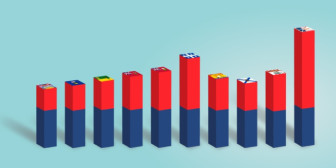
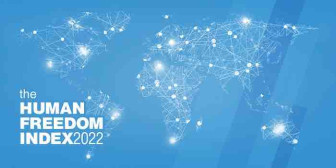 TORONTO—For the first time since 2012, Canada does not rank among the top 10 freest countries worldwide, finds a new study released today by Canada’s Fraser Institute and the U.S.-based Cato Institute.
“During the pandemic, like other governments worldwide, governments in Canada restricted freedom of movement, expression, assembly and other freedoms even more than had in previous years,” said Fred McMahon, resident fellow at the Fraser Institute and co-author of this year’s
TORONTO—For the first time since 2012, Canada does not rank among the top 10 freest countries worldwide, finds a new study released today by Canada’s Fraser Institute and the U.S.-based Cato Institute.
“During the pandemic, like other governments worldwide, governments in Canada restricted freedom of movement, expression, assembly and other freedoms even more than had in previous years,” said Fred McMahon, resident fellow at the Fraser Institute and co-author of this year’s 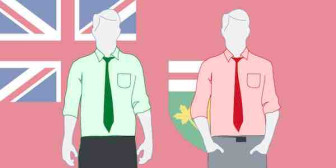 TORONTO—Government workers in Ontario enjoy a wage premium and more generous benefits compared to comparable private sector workers, finds a new study published by the Fraser Institute, an independent, non-partisan Canadian public policy think-tank.
“At a time when governments are facing serious fiscal pressures, bringing government sector compensation in line with the private sector would help reduce costs without necessarily affecting services,” said Ben Eisen, a senior fellow with the Fraser Institute.
TORONTO—Government workers in Ontario enjoy a wage premium and more generous benefits compared to comparable private sector workers, finds a new study published by the Fraser Institute, an independent, non-partisan Canadian public policy think-tank.
“At a time when governments are facing serious fiscal pressures, bringing government sector compensation in line with the private sector would help reduce costs without necessarily affecting services,” said Ben Eisen, a senior fellow with the Fraser Institute.
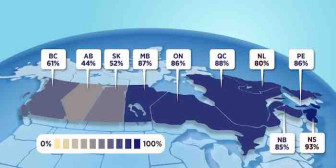 TORONTO—Combined federal and provincial debt in Canada has nearly doubled from $1.1 trillion in 2007/08 (the year before the last recession) to a projected $2.1 trillion this year—with Ontario as the most indebted province relative to the size of its economy—finds a new study released today by the Fraser Institute, an independent, non-partisan Canadian public policy think-tank.
“Government debt—federally and in most provinces—has grown substantially over the past 13 years, creating serious fiscal challenges for Ottawa and provincial governments in the years ahead,” said Jake Fuss, associate director of fiscal studies at the Fraser Institute and co-author of T
TORONTO—Combined federal and provincial debt in Canada has nearly doubled from $1.1 trillion in 2007/08 (the year before the last recession) to a projected $2.1 trillion this year—with Ontario as the most indebted province relative to the size of its economy—finds a new study released today by the Fraser Institute, an independent, non-partisan Canadian public policy think-tank.
“Government debt—federally and in most provinces—has grown substantially over the past 13 years, creating serious fiscal challenges for Ottawa and provincial governments in the years ahead,” said Jake Fuss, associate director of fiscal studies at the Fraser Institute and co-author of T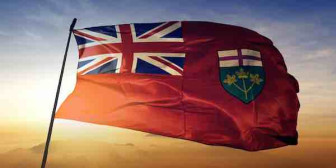 TORONTO—Despite promises that provincial personal income tax increases in 2012 and 2013 would be temporary, successive governments have kept them in place for a decade, finds a new study released today by the Fraser Institute, an independent, non-partisan Canadian public policy think-tank.
“The recent history of personal income tax rates in Ontario is that tax increases governments promised would be temporary ended up being permanent,” said Ben Eisen, senior fellow at the Fraser Institute and co-author of
TORONTO—Despite promises that provincial personal income tax increases in 2012 and 2013 would be temporary, successive governments have kept them in place for a decade, finds a new study released today by the Fraser Institute, an independent, non-partisan Canadian public policy think-tank.
“The recent history of personal income tax rates in Ontario is that tax increases governments promised would be temporary ended up being permanent,” said Ben Eisen, senior fellow at the Fraser Institute and co-author of 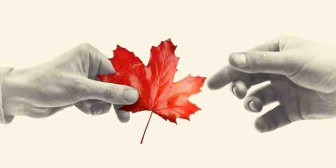 VANCOUVER—The number of Canadians donating to charity—as a percentage of all tax filers—is at the lowest point in 20 years, finds a new study published by the Fraser Institute, an independent, non-partisan Canadian public policy think-tank.
“The holiday season is a time to reflect on charitable giving, and the data shows Canadians are consistently less charitable every year, which means charities face greater challenges to secure resources to help those in need,” said Jake Fuss, senior policy analyst with the Fraser Institute and co-author of
VANCOUVER—The number of Canadians donating to charity—as a percentage of all tax filers—is at the lowest point in 20 years, finds a new study published by the Fraser Institute, an independent, non-partisan Canadian public policy think-tank.
“The holiday season is a time to reflect on charitable giving, and the data shows Canadians are consistently less charitable every year, which means charities face greater challenges to secure resources to help those in need,” said Jake Fuss, senior policy analyst with the Fraser Institute and co-author of 
 VANCOUVER—The current and projected taxing, spending, and borrowing policies, broadly referred to as the fiscal policies of governments (federal and provincial) are unsustainable, with debt expected to rise relative to the size of the economy in the coming decades, finds a new study by the Fraser Institute, an independent, non-partisan Canadian public policy think-tank.
“There has been skepticism in the past about binding governments to clear fiscal rules, however research shows that governments adopting such rules have stronger fiscal positions and more stable policies than those that don’t,” said Jake Fuss, associate director of fiscal studies at the Fraser Institute and co-author of
VANCOUVER—The current and projected taxing, spending, and borrowing policies, broadly referred to as the fiscal policies of governments (federal and provincial) are unsustainable, with debt expected to rise relative to the size of the economy in the coming decades, finds a new study by the Fraser Institute, an independent, non-partisan Canadian public policy think-tank.
“There has been skepticism in the past about binding governments to clear fiscal rules, however research shows that governments adopting such rules have stronger fiscal positions and more stable policies than those that don’t,” said Jake Fuss, associate director of fiscal studies at the Fraser Institute and co-author of 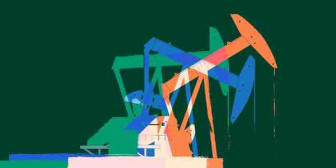 VANCOUVER—Wyoming and Texas are considered far more attractive for investment than any Canadian province, including Alberta, according to this year’s survey of petroleum-sector executives released today by the Fraser Institute, an independent, non-partisan, Canadian public policy think-tank.
“The message from investors is clear—Canada’s onerous and uncertain regulatory environment continues to hurt the investment attractiveness of the country’s oil and gas industry,” said Elmira Aliakbari, director of the Fraser Institute’s centre for natural resource studies and co-author of the latest
VANCOUVER—Wyoming and Texas are considered far more attractive for investment than any Canadian province, including Alberta, according to this year’s survey of petroleum-sector executives released today by the Fraser Institute, an independent, non-partisan, Canadian public policy think-tank.
“The message from investors is clear—Canada’s onerous and uncertain regulatory environment continues to hurt the investment attractiveness of the country’s oil and gas industry,” said Elmira Aliakbari, director of the Fraser Institute’s centre for natural resource studies and co-author of the latest  VANCOUVER—Corporate charitable giving driven by ESG could produce more harm than good when it comes to overall charitable donations, warns a new essay released today by the Fraser Institute, an independent, non-partisan Canadian public policy think-tank.
“While charitable giving helps organizations that receive donations and improves the image of corporations, there’s a downside to corporate philanthropy,” said Dr. Marvin Olasky, a Discovery Institute and Acton Institute fellow, and author of
VANCOUVER—Corporate charitable giving driven by ESG could produce more harm than good when it comes to overall charitable donations, warns a new essay released today by the Fraser Institute, an independent, non-partisan Canadian public policy think-tank.
“While charitable giving helps organizations that receive donations and improves the image of corporations, there’s a downside to corporate philanthropy,” said Dr. Marvin Olasky, a Discovery Institute and Acton Institute fellow, and author of 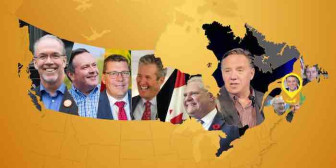 VANCOUVER—Among recent and current Canadian premiers, New Brunswick’s Blain Higgs ranks highest for managing provincial finances, while Newfoundland and Labrador’s Andrew Furey ranks 10th, finds a new study released today by the Fraser Institute, an independent, non-partisan Canadian public policy think-tank.
“Sound fiscal policy is a crucial driver of economic well-being for Canadians, and the premier sets the direction of a government,” said Jake Fuss, associate director of fiscal studies at the Fraser Institute and co-author of
VANCOUVER—Among recent and current Canadian premiers, New Brunswick’s Blain Higgs ranks highest for managing provincial finances, while Newfoundland and Labrador’s Andrew Furey ranks 10th, finds a new study released today by the Fraser Institute, an independent, non-partisan Canadian public policy think-tank.
“Sound fiscal policy is a crucial driver of economic well-being for Canadians, and the premier sets the direction of a government,” said Jake Fuss, associate director of fiscal studies at the Fraser Institute and co-author of 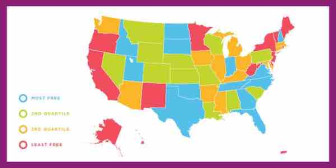 TORONTO—For the first time, every Canadian province ranks in the bottom half of countries in our annual rankings of economic freedom in North America, finds a new report released today by the Fraser Institute, an independent, non-partisan, public policy think-tank.
Economic freedom—the ability of individuals to make their own economic decisions about what to buy, where to work and whether to start a business—remains fundamental to prosperity.
TORONTO—For the first time, every Canadian province ranks in the bottom half of countries in our annual rankings of economic freedom in North America, finds a new report released today by the Fraser Institute, an independent, non-partisan, public policy think-tank.
Economic freedom—the ability of individuals to make their own economic decisions about what to buy, where to work and whether to start a business—remains fundamental to prosperity.
 VANCOUVER—Despite spending more on health care than most other developed countries with universal coverage, Canada has some of the lowest numbers of doctors, hospital beds, and medical technologies—and the longest wait times, finds a new study released today by the Fraser Institute, an independent, non-partisan Canadian public policy think-tank.
“There is a clear imbalance between the high cost of Canada’s health-care system and the value Canadians receive in terms of availability of resources and timely access to care,” said Bacchus Barua, director of Health Policy Studies at the Fraser Institute and co-author of Comparing Performance of Universal Health Care Countries, 2022.
VANCOUVER—Despite spending more on health care than most other developed countries with universal coverage, Canada has some of the lowest numbers of doctors, hospital beds, and medical technologies—and the longest wait times, finds a new study released today by the Fraser Institute, an independent, non-partisan Canadian public policy think-tank.
“There is a clear imbalance between the high cost of Canada’s health-care system and the value Canadians receive in terms of availability of resources and timely access to care,” said Bacchus Barua, director of Health Policy Studies at the Fraser Institute and co-author of Comparing Performance of Universal Health Care Countries, 2022.
 CALGARY—The top 20 per cent of income-earning families pay more than half (53.0 per cent) of total taxes including personal income, sales and property taxes, according to a new study published by the Fraser Institute, an independent non-partisan Canadian think tank.
"Despite the common misperception that top earners don't pay their 'fair share' of taxes, in reality these households pay a disproportionately large share of the total tax bill," said Jake Fuss, associate director of fiscal studies at the Fraser Institute and co-author of
CALGARY—The top 20 per cent of income-earning families pay more than half (53.0 per cent) of total taxes including personal income, sales and property taxes, according to a new study published by the Fraser Institute, an independent non-partisan Canadian think tank.
"Despite the common misperception that top earners don't pay their 'fair share' of taxes, in reality these households pay a disproportionately large share of the total tax bill," said Jake Fuss, associate director of fiscal studies at the Fraser Institute and co-author of  VANCOUVER—Once a province or state exceeds a certain population size, the government’s role in the economy begins to grow, finds a new study released today by the Fraser Institute, an independent, non-partisan Canadian public policy think-tank.
“If the population grows past certain thresholds, the size of government compared to the economy also begins to grow, which can limit the economic opportunities for residents,” said Russell Sobel, professor of economics and entrepreneurship at the Citadel, senior fellow at the Fraser Institute and author of Population and the Fiscal Outcomes of Subnational Jurisdictions.
VANCOUVER—Once a province or state exceeds a certain population size, the government’s role in the economy begins to grow, finds a new study released today by the Fraser Institute, an independent, non-partisan Canadian public policy think-tank.
“If the population grows past certain thresholds, the size of government compared to the economy also begins to grow, which can limit the economic opportunities for residents,” said Russell Sobel, professor of economics and entrepreneurship at the Citadel, senior fellow at the Fraser Institute and author of Population and the Fiscal Outcomes of Subnational Jurisdictions.
 VANCOUVER—According to a broad review of existing research, there is no conclusive evidence that investing in companies with higher ESG rankings produces higher returns for investors, finds a new essay released today by the Fraser Institute, an independent, non-partisan Canadian public policy think-tank.
“Any debate about ESG, which is gaining steam in Canada and around the world, should be based on sober analysis and empirical evidence,” said Steven Globerman, professor emeritus at Western Washington University, senior fellow at the Fraser Institute and author of ESG Investing and Asset Returns.
VANCOUVER—According to a broad review of existing research, there is no conclusive evidence that investing in companies with higher ESG rankings produces higher returns for investors, finds a new essay released today by the Fraser Institute, an independent, non-partisan Canadian public policy think-tank.
“Any debate about ESG, which is gaining steam in Canada and around the world, should be based on sober analysis and empirical evidence,” said Steven Globerman, professor emeritus at Western Washington University, senior fellow at the Fraser Institute and author of ESG Investing and Asset Returns.
 VANCOUVER—A large portion of Ottawa’s record-high spending during the pandemic did not relate directly to COVID-related health care or income support for individuals and businesses, finds a new study published today by the Fraser Institute, an independent, non-partisan Canadian public policy think-tank.
“Canadians may be surprised to learn that a significant percentage of Ottawa’s huge spending increases during COVID, which produced large deficits and much more debt, had nothing to do with the pandemic,” said Livio Di Matteo, professor of economics at Lakehead University, senior fellow at the Fraser Institute and author of
VANCOUVER—A large portion of Ottawa’s record-high spending during the pandemic did not relate directly to COVID-related health care or income support for individuals and businesses, finds a new study published today by the Fraser Institute, an independent, non-partisan Canadian public policy think-tank.
“Canadians may be surprised to learn that a significant percentage of Ottawa’s huge spending increases during COVID, which produced large deficits and much more debt, had nothing to do with the pandemic,” said Livio Di Matteo, professor of economics at Lakehead University, senior fellow at the Fraser Institute and author of  VANCOUVER—Despite common misperceptions, spending on public schools across Canada increased in seven out of ten provinces, markedly in five provinces, between 2012-13 and 2019-20, before COVID spending started, finds a new study by the Fraser Institute, an independent, non-partisan Canadian public policy think-tank.
“Contrary to what we often hear, spending is on the rise in public schools across Canada, and in most cases, it’s outpacing inflation and enrolment changes,” said Jake Fuss, associate director of fiscal studies for the Fraser Institute and co-author of
VANCOUVER—Despite common misperceptions, spending on public schools across Canada increased in seven out of ten provinces, markedly in five provinces, between 2012-13 and 2019-20, before COVID spending started, finds a new study by the Fraser Institute, an independent, non-partisan Canadian public policy think-tank.
“Contrary to what we often hear, spending is on the rise in public schools across Canada, and in most cases, it’s outpacing inflation and enrolment changes,” said Jake Fuss, associate director of fiscal studies for the Fraser Institute and co-author of